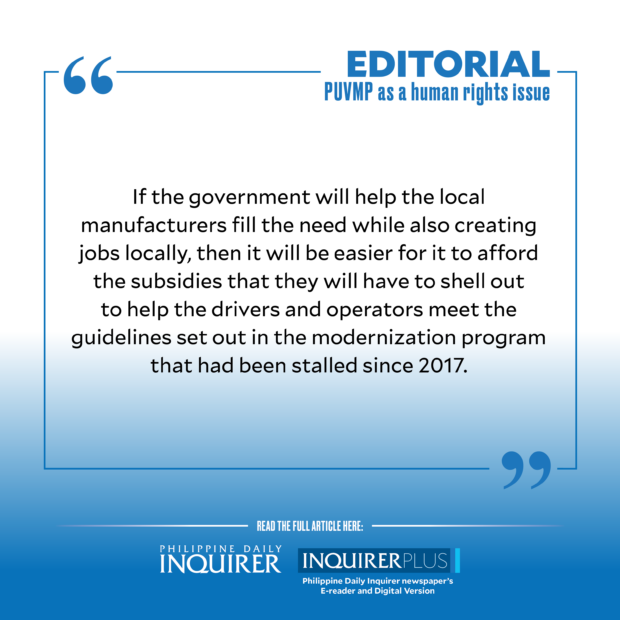PUVMP as a human rights issue

There is no denying the wisdom nor the urgent need to make the iconic jeepneys that have long served the commuting public and have become part of the Filipino cultural landscape, more efficient and more environment-friendly. But the road to the government’s Public Utility Vehicle Modernization Program (PUVMP), as it is called, is fraught with friction and anxiety for the sector most affected by it.
As transport groups staged protests nationwide since last year, and lawmakers raised concerns about corruption attending the potential suppliers of the old jeepneys’ replacement, it has been clear that the Marcos administration should not run roughshod over drivers and operators just to meet its jeep modernization objective.
The PUVMP, after all, is not just an economic, safety or environmental issue, but an issue of the rights of the thousands of jeepney drivers and operators who will be the most affected, as pointed out by the Commission on Human Rights last week.
Article continues after this advertisementGenuine progress
“The Commission believes that genuine progress is inclusive and leaves no one behind. Given the economic and financial implications of PUVMP, the majority of the program’s financial burden will fall on drivers and operators,” the CHR said, warning the consequences could drive them deeper into poverty.
As such, the rights body called on the government to “efficiently subsidize the program, develop an effective communication strategy for the general public, and make the implementing rules and regulations of PUVMP more understandable.”
The CHR spoke up after the Land Transportation Franchising and Regulatory Board (LTFRB) announced that jeepney operators and drivers only have until Jan. 31 to consolidate into cooperatives or corporations as part of the first step of the PUVMP.
Article continues after this advertisementUnder the mandatory franchise consolidation, only one cooperative or corporation will be granted a franchise for a single route, thus the traditional jeepney and untility van express that will not be consolidated will no longer be allowed to operate, putting thousands of drivers and operators nationwide at risk of losing their primary means of livelihood.
Major roadblocks
The program also requires that traditional, diesel-run PUVs like jeepneys and UV Expresses shift to Euro-4 friendly units, which are pegged at around P2.4 million, clearly beyond the reach of the majority of drivers and operators hence the need for subsidy and further studies on ways to bring down that cost.
And as think tank Ibon Foundation underscored, the cost of modernization covers not only the unit cost but also the expenses associated with forming and coordinating a cooperative or corporation and maintaining the units.
Indeed, it is the steep price of the more modern jeepneys and the transition program that has emerged as the major roadblock to the modernization program as expressed by the transport groups, which said that they do support the program and want to get the safer and more efficient units that should allow them to earn more in the long run.
Traditional jeepney
The government can provide incentives so that the traditional jeepney manufacturers such as Sarao and Francisco Motors can bring to the market modern jeepneys that will solve the problems with fuel efficiency and safety while keeping the traditional look that is close to the heart of Filipinos and, more improtantly, at a cost of just under P1 million each.
This will then also ease concerns that unscrupulous past and present officials of the Department of Transportation are forcing the program and the deadline down the throats of the hapless drivers and operators because they want to bring in modern jeepneys from China that cost a steep P2.6 million to P2.9 million each.
China-made vehicles
“Ang karagatan natin sa West Philippine Sea ay sinasakop na nga ng China, pati ba naman mga kalsada natin ay papayag tayong sasakupin na rin nila?!” asked Sen. Raffy Tulfo.
If the real intention is to modernize, not phase out the jeepneys as some transport groups suspect, then there is no reason to get the bland-looking China-made vehicles.
And if the government will help the local manufacturers fill the need while also creating jobs locally, then it will be easier for it to afford the subsidies that they will have to shell out to help the drivers and operators meet the guidelines set out in the modernization program that had been stalled since 2017.
Legitimate grievances
1-rider Party-list Rep. Bonifacio Bosita had warned that the minimum fare may go up to an astronomical P30 and P40. Even the increased subsidy “does not alleviate fears that the program will simply push poorer operators out, allowing well-financed corporations to take over,” said the CHR.
Clearly, there is no need to put the brakes on the program, but it may be more prudent at this time to move to a lower gear to make sure that the affected Filipinos’ legitimate grievances are really heard and resolved.
After all, what the Marcos administration wants is to help pull these drivers and operators out of poverty, not push them deeper into it.
















